#viennese emperor
Text
Moth Of The Day #203
Giant Peacock Moth / Great Peacock Moth / Giant Emperor Moth / Viennese Emperor
Saturnia pyri
From the saturniidae family. They have a wingspan of 15-20 cm. They can be found throughout Europe and North Africa.


Image sources: [1] [2]
#moth#moths#lepidopterology#lepidoptera#nature#pretty moth#insect#bugs#moth of the day#motd#lepidoptery#entomology#bugblr#bug#insects#giant peacock moth#giant emperor moth#great peacock moth#viennese emperor#saturnia pyri#saturniidae#saturniid#saturniidae moth
358 notes
·
View notes
Text

Happy pride moth 🦋
34 notes
·
View notes
Text
Kuroshitsuji
and Radetzky March
Every New Year’s Day, it is a tradition that the Viennese Philharmonic Orchestra plays this staple public favourite to end their performance. The concert is televised in more than 90 countries. Last year, they began to stream it on the internet, which one can watch for free in five days.
youtube
Seiji Ozawa conducting, 2002
Anyway, since I’ve become interested in Kuroshitsuji/Black Butler it is thrilling to find out that Yana Toboso included it on her story. Will the song be incorporated into the Public School arc in April? I’d love to see and hear Sebastian Michaelis as the maestro conducting it.
Now, it is true that it is a patriotic song. And the history behind it is bloody. The melody is very happy for sure, as if you’ve come out from the battle/war unscathed. Victorious, yes. Who wouldn’t be? No wonder, Sebastian loves it. It also has the same cadence like the heartbeat.
A background: Strauss the Father composed it for the Count Joseph Radetzky von Radetz. It is to commemorate his regiment’s advancing to Northern Italy. One time listening to our tour guide in Venice, she mentioned this part of history to us, she showed us the cannons they retrieved from the Austrian army, which fired and destroyed their buildings indiscriminately during the bloody days of 1848. Those states made up of the Austrian-Hungary Empire that wanted their freedom so much but the emperor sent his troops instead to stop these revolts from happening. One Venetian hotel that survived the bombing incorporated the cannonballs to its building as a reminder of the centuries past.
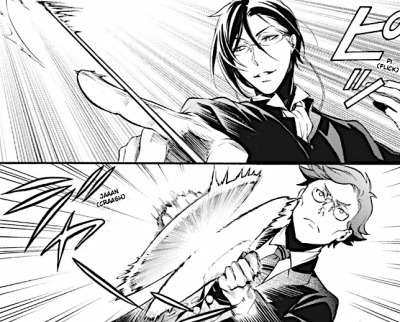
Some Austrian historians believe it is time to “cancel” the song or rather remove the song from the yearly Neujahrskonzert. The yearly traditional concert has a few problems. But not this song. One of them is the lack of female conductors leading the orchestra. Whereas Ricardo Mutti, an Italian maestro, will reportedly lead the concert again next year for the, get this, seventh time!!!

It was only in 2002 when they let the late Japanese conductor Seiji Ozawa, the first ever Asian, to lead the orchestra and received standing ovation after playing the staple ending song of Radetzky March.
It is very important to remember the past and learn from it. Austria, once an empire, knows it very well, to be stripped of the lands and power it once willed. But in some aspects they learned the lesson. Not all, but most. Thing is, removing this song from the yearly concert feels like something is lacking. Also, I don’t think it would solve the issue of the Austrian philharmonic orchestra where it is dominated by male musicians.
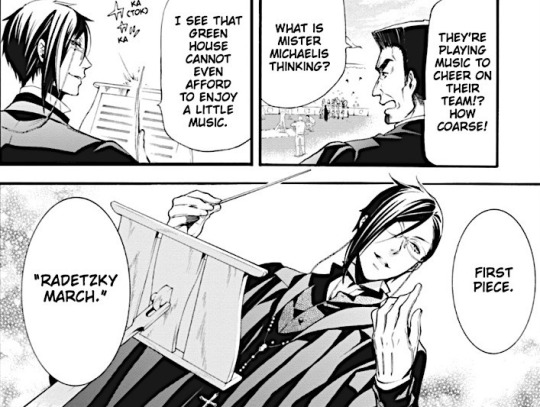
I digress.
Am curious of Yana T’s connection to it. I would really love to know if she watches the televised concert every New Year’s Day. Or did she choose it specifically bc of popularity or the history. Or the melody.
#kuroshitsuji#black butler#sebastian michaelis#ciel phantomhive#yana toboso#the public school arc#radetzky march#johann strauss i#Youtube#wall of text#kuroshitsuji meta
42 notes
·
View notes
Text

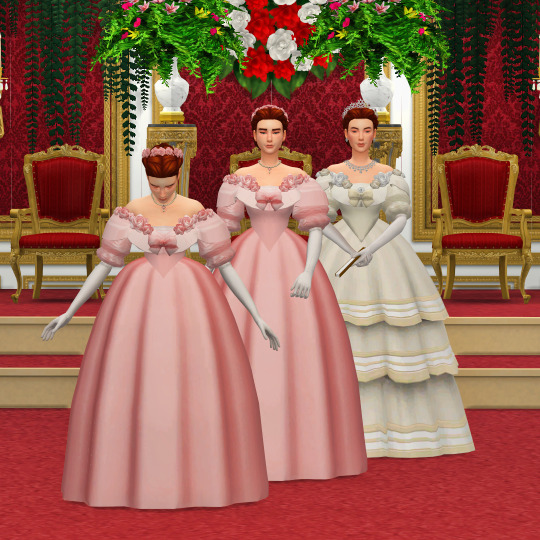
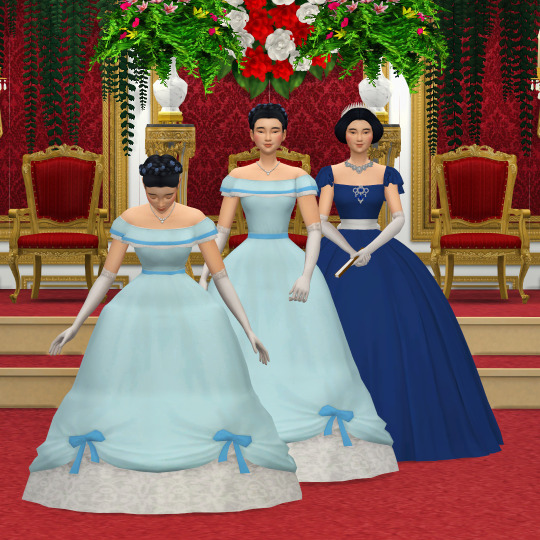


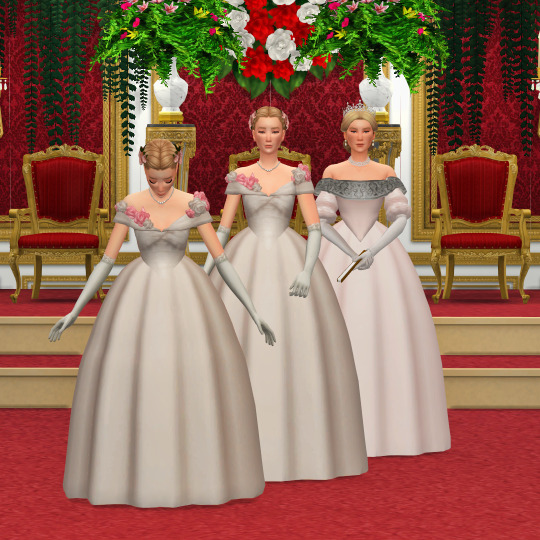
1850's Court Ball Decos - BatsFromWesteros
In the Imperial Court of Vienna, there were two categories of balls. The "official" is the Court Ball, starting at 8pm. The whole court was invited, including members of the diplomatic corps, owners of different orders and official titles, high dignitaries and members of the Viennese garrisons. It was always the Empress who set the date for the ball, it usually took place at the end of January. Only the highest ranking members got an official invitation, the rest of the guests were notified at court (as 90% of the guests were "courtiers"). It was the Court Ball, where debutantes entered society. They were introduced to the Empress in a nearby room by her Obersthofmeisterin. Due to the many guests (around 1500-2000 people) and lack of space, there wasn't much dancing, it was more of a social event, where guests had the chance to speak to the Emperor and Empress during a cercle.
15 Decos - 6 swatches each
5 Debutantes - Curtsying + Standing
5 Mothers - Standing
BGC
Shoutout and thank you to all cc-creators!
DOWNLOAD (Patreon - Free)
#ts4#s4#sims4#ts4cc#s4cc#sims4cc#deco#decosim#ts4 decosim#victorian#ball#1850s#Deco sims#ball deco sim#court ball#sims 4#sims 4 cc#batsfromwesteros
588 notes
·
View notes
Text
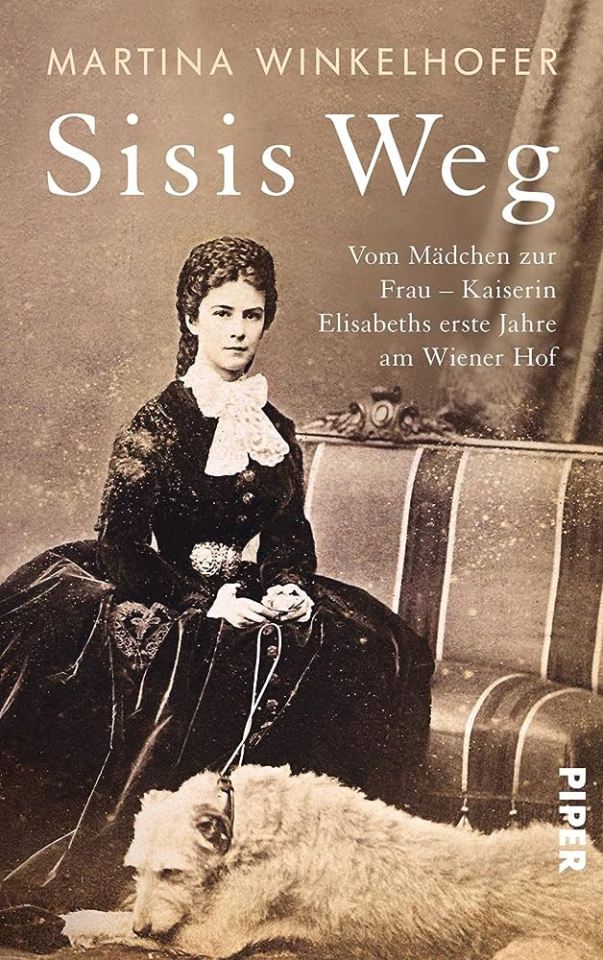

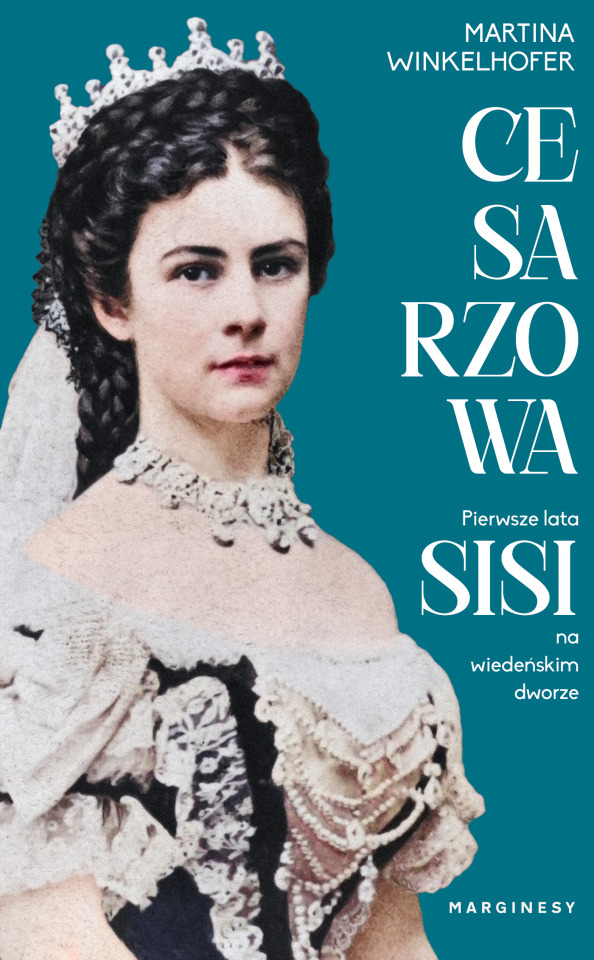
BOOK REVIEW: Sisis Weg by Martina Winkelhofer
Empress Elisabeth took a break from court life and dared to escape her assigned role, something that no woman of her time, certainly not of her rank, was allowed to do. Until the death of her eldest daughter, Elisabeth was a product of her environment: the good daughter, the devoted wife, the submissive daughter-in-law. She tried to live up to expectations even in her darkest hours, until her body and psyche sounded the alarm. She knew that in this environment the wounds would not heal. She allowed herself long journeys and stays away from the imperial court, and it did not take long for her transformation to begin: from fragile emperor's wife to self-confident empress. From a woman determined by others to a woman determined by herself.
There are already literally dozens of books about Sisi, and most of them have nothing new to say. So when yet another book written by an author that claims they're presenting "the real story" behind the Sisi myth appears, one is naturally distrustful. But only reading the preview of this book made me realize that historian Martina Winkelhofer actually had something new to say about Elisabeth. This book has been in my TBR for the past two years, and tired of waiting for a translation I just went ahead and used an automatic translator to read it. And guess what: this is one of the best books about Empress Elisabeth that exists.
Martina Winkelhofer's biography starts with Elisabeth's birth and finishes with her return to Vienna in 1862, after being away from court for two years. Something that distinguishes her from other Sisi authors is that instead of presenting a novel-like narrative about the empress' life, she adresses on the text the different sources that we have available, and isn't afraid to state frankly that there are thing we simply lack enough information to know for certain. Speaking of sources, she draws almost entirely from primary sources, and not just letters, but also court protocol documents, which brings the Viennese court to life in a way no other book about Elisabeth I've read before achieved.
This is also the Sisi biography with the most sympathetic and balanced depiction of Archduchess Sophie I've ever read, presenting the complex relationship between mother and daughter-in-law without vilifying either woman. Not only Winkelhofer adresses the problem regarding the sources (Elisabeth's statements about her mother-in-law come from after Sophie's death, and Sophie's correspondance and diary entries avoid mentioning any conflicts or quarrels within the imperial family), but also she understands both that Elisabeth was a very young girl who lacked the skills to understand court schemes and was deeply intimidated by the hierarchy at court - and therefore, by her mother-in-law, and that Sophie ultimately had no ill intentions towards her daughter-in-law, but simply couldn't understand why Elisabeth couldn't fulfill her role as empress as tradition demanded.
Another of my favorite things about this book is the attention Winkelhofer paid to Elisabeth's staff. The working and living conditions of her servants is often highlighted. There is a whole chapter focused on Elisabeth's secretary Leopold Bayer, a bourgeois man that was responsible of controlling and organizing the empress' household and was so effective at his job that years after his retirement his system still worked perfectly. Perhaps if you want to read only about Sisi you'll find this chapter, as well as all the other instances in which Winkelhofer focuses on the staff, uninteresting and disruptive, but I loved it. So many authors seem to think that the people responsible for cleaning, cooking and keeping royal households running weren't glamorous enough to deserve even a mention, so it was very refreshing to see how here it was an important part of the text.
To be honest, my biggest complain about this book is that it ended. This biography finishes when Elisabeth returns to Vienna in 1862; Winkelhofer is going to release the second part of her biography in October, but I wish she had just released it as a single-volume book, because if there is a historical woman you can get away with writing a 600+ pages long book is Elisabeth. And while the book is well sourced (over 500 footnotes!!!), she often made more general claims about the general lives of the aristocracy with no citations. Since Winkelhofer has written books specifically about the lives of the aristocracy before I trust she knows her stuff, I just wish she had referenced further literature on the matter. Also because I'm a Queen Marie of the Two Sicilies girlie, it disappointed me that Winkelhofer didn't mention her two weeks stay in Vienna in 1859, nor how her role during the Siege of Gaeta was one of the things that stressed her sister during 1860.
Overall this is a fantastic book that paints a complex and interesting picture of how the child Elise became in the young Sisi and then in the Empress Elisabeth. Let's hope that an English translation is happening soon!
#my new clown hope is that the english translation is going to combine the two volumes into one#book review#historian: martina winkelhofer#empress elisabeth of austria
63 notes
·
View notes
Text
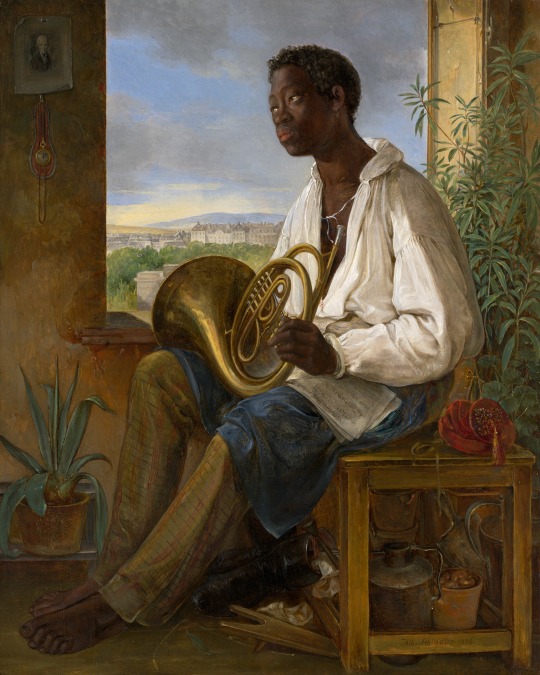
Portrait of Emmanuel Rio
1836
Artist:
Albert Schindler
Austrian, 1805-1861
Previously known only as “a gardener and horn player,” recent research has identified the figure in this painting as Emmanuel Rio, an enslaved Brazilian man of African descent who was sent to Emperor Francis I in Vienna around 1820. About ten years old when he arrived in Vienna, Rio was enrolled in an elite private school, where he excelled in French, Italian, drawing, and especially music. Francis fostered his talent, gifting Rio a French horn on the occasion of his graduation. Despite his aptitude for music, Rio was assigned to work in the imperial garden.
In this portrait, produced a year after the emperor’s death, Rio holds his favored instrument while looking at an image of Francis, beneath which hangs a gold watch given to him by the monarch. The painting’s sentimentality does little to suggest the precariousness of its subject’s situation in Vienna, which only worsened after Francis died. For the rest of his life, Viennese officials moved Rio to various positions throughout Europe, threatened him with forced military service when he resisted, and, by the late 1840s, discussed sending him back to Brazil or to Africa.
AIC
110 notes
·
View notes
Text
Letter from Marie Louise to her father
Written shortly after the "handover" ceremony in Sankt Peter close to Braunau. For this ceremony, a wooden building, divided into three parts (French - neutral - Austrian), had been constructed, usually referred to as the "three pavillions" or "three barracks". The leaders of the two delegations, Berthier and Trautmannsdorf, both signed the contract before the bride was handed over to the buyer bridegroom's delegation.
Dearest Papa!
Forgive me for not immediately writing to you yesterday, as I should have done, but the journey, which was a little tiring and long, prevented me from doing so. Through Prince Trautmansdorf I have found another opportunity to write to you once more sincerely, and I am happy to seize it to assure you that I am constantly thinking of you and always will.
"Sincerely" here probably means "without measuring my words because I'm being spied upon by my new entourage".
God has given me the strength to endure happily even the last painful blow, the separation from all my loved ones, in Him alone I have all my trust, He will help me and give me courage, and I will find my reassurance in the consolation of having done my duty to you by making this sacrifice.
Yesterday I arrived in Ried very late, still preoccupied with the thought that I might be separated from you forever. Today I arrived at two o'clock in the French camp in the barracks at Braunau, after staying in the Austrian barrack for some time, I moved to a throne in the neutral barracks, after the papers had been read, all my people kissed my hand, at that moment I really didn't know what I was doing, a cold shiver overcame me and I became so upset that the Prince of Neufchatel began to cry.
Which must have been a sight to behold: Berthier crying tears of emotion while his new empress starts to panic and desperately looks around for the emergency exit.
Prince Trautmansdorf handed me over to him [...]
... and a kleenex, too ...
[...] and my entire court was presented to me, oh God, what a difference between the French and Viennese ladies! --- The Queen of Naples came to meet me in the other room, I embraced her, and showed myself remarkably friendly towards her, but I do not quite trust her, I believe that it was not zeal for service alone that was the cause of her journey.
That's a very interesting first assessment of Caroline Murat. Marie Louise may have been less naive than she made herself out to be.
She travelled with me to Braunau, and here I had to hold a two-hour toilette, I assure you that I am already as perfumed as all the other French women.
Apparently, the difference mentioned above was largely attributable to odour.
The Emperor Napoleon has sent me a splendid golden robe, but he has not yet written to me - if I had to leave you, I would much rather be with him than travelling with all those ladies.
That's one thing that will remain true for a large part, I believe. With the one exception of the duchess de Montebello, she did not really appreciate the ladies of the French court (and Louise Lannes she apparently appreciated to some extent because she was not much suited for life at court).
Oh God, how I regret not being able to still spend the happy days with you, only now am I learning to appreciate them. I assure you, dearest Papa, that I am very sad and cannot yet console myself. I hope your catarrh will be completely over; I include you in my prayers every day. Forgive my poor scribbling, but I have so few moments to myself, I will kiss your hands a thousand more times and have the honour of being
Dearest Papa!
Your most submissive and obedient daughter Louise
Braunau 16th March 1810
(Source: Helfert "Maria Louise, Erzherzogin von Österreich, Kaiserin der Franzosen", Wien 1873)
15 notes
·
View notes
Text







The Empress || Die Kaiserin 2022
In 1800s Austria, passionate and rebellious Sisi and Emperor Franz Joseph face love under duress, intrigues and power struggles at the Viennese court.
Starring: Devrim Lingnau, Philip Froissant, Melika Foroutan.
#the empress netflix#the empress (2022)#the empress#die kaiserin netflix#sisi 2022#devrim lingnau#philip froissant#sisi series#elisabeth of austria hungary#elisabeth of austria#historical drama#costume drama#perioddrama#periodcostume#perioddramagif#perioddramaedit#period dramas#weloveperioddramas#onlyperioddramas#netflix series
280 notes
·
View notes
Photo
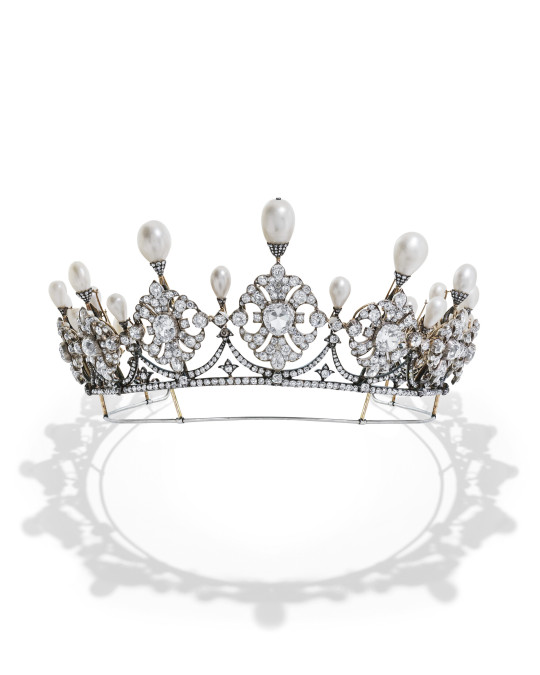
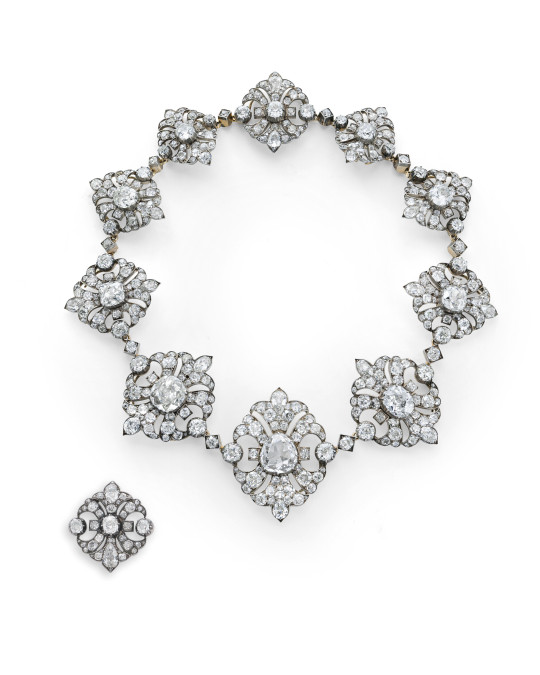
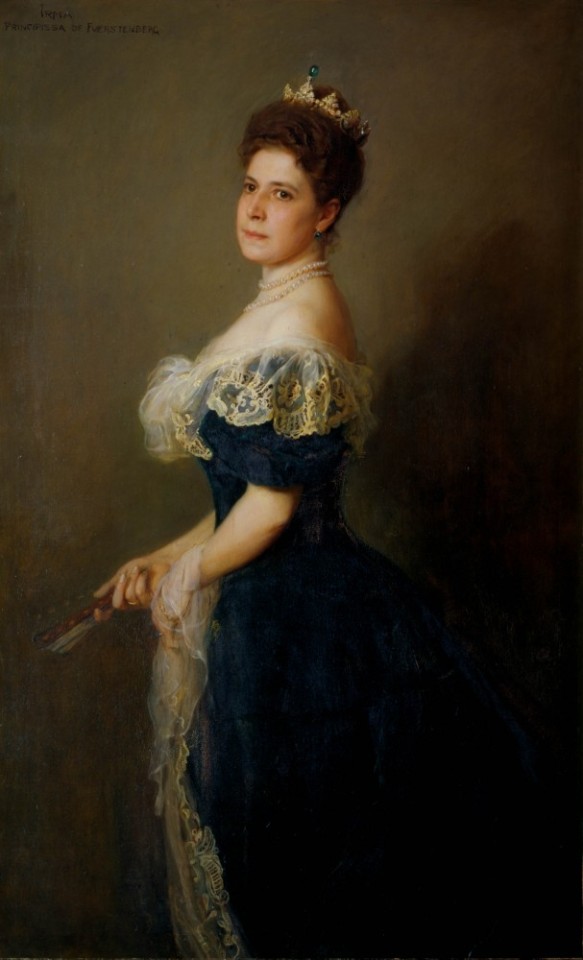
The Fürstenberg Tiara
1870s-1890s
The letter which is kept in the Fürstenberg archives, headed by Flach Mediansky & Paltscho, famous Austrian jewelers at the end of the XIX century, explains the many ways in which the extraordinary tiara can be worn. The first and most obvious one, is to wear it complete. Eleven diamond motives in the shape of a double fleur-de-lys, twenty-three pear-shaped pearls (three larger ones) are all fixed on a old-cut diamond frame. This is the way that tiara must have been worn in court by its then owner: H.S.H. the princess of Fürstenberg, née countess Irma of Schönborn Buchheim (1867-1948). Although most of their lands were located in Germany, in the south of Baden-Württemberg, the princes of Fürstenberg were princes of the Holy Roman Empire and they had received their titles from the Habsburg emperors. They also owned land in Bohemia and a very impressive palace in Vienna. Therefore, they were very much part of the Viennese high society.
The Austrian season always started in January with the New Year’s reception and ended in May with the Corpus Christie’s procession which was described by some as "God’s court ball.” Between those two dates, concerts, lavish dinners, private and official balls would take place. The most important of those events were the balls given at the Hofburg palace by the order of His Majesty Emperor Franz Joseph I. Divided in two categories: Court balls and Balls at Court. 2000 guests were invited to the Court Balls. The list would include guests from the aristocracy, but also from the political and military world. Balls at Court only included 800 guests, chosen exclusively among the higher aristocracy. The princesses of Fürstenberg were included in both lists and were also invited to opera premières and private concerts. Therefore the princesses needed quite a few tiaras, or at least a very transformable one.
In the letter, the jeweller mentions a second way to wear the tiara, simply by removing the diamond motives. This way the 23 pearls seemed to just hang among the hair. A third way, even lighter, but still impressive, was to remove the smaller pearls, leaving only the big ones. A fourth way, was to wear only the diamond motives with no pearls. There was of course a fifth way, not mentioned in the letter, to replace the pearls with other precious stones. And this is exactly what princess Irma of Fürstenberg did when she had her portrait painted by Laszlo. She replaced the central pearl with an emerald drop. The diamond motives could also be assembled to be worn as a rather impressive diamond necklace. And each diamond motive could be worn as a brooch or a hair pin.
For centuries, the Fürstenberg family had been at the very top list of the most important aristocratical families in the Habsburg Empire. The wealth and status of that family was such that in 1770, when archduchess Marie-Antoinette travelled to Versailles where she would marry the future Louis XVI of France, Donaueschingen was chosen as one of her stops. Prince Starhemberg, who was commander of the escort of the archduchess, was so amazed by the splendor of the Fürstenberg court that he wrote to Empress Marie-Thérèse, on the 3rd of May 1770:
Around three in the afternoon, we arrived at the Prince of Fürstenberg’s estate at Donaueschingen. All here is established with magnificence as if the court was that of a sovereign. All the male courtesans were wearing a very rich uniform. And the ladies, including the princess, had white silk dresses embroidered with golden lace. The Prince had all the roads of his principality rebuilt for the archduchess’ trip. It must have cost him more than 200,000 gold florins.
-Vincent Meylan
Christie’s
#tiara#necklace#fashion history#historical fashion#victorian#1870s#1880s#1890s#19th century#diamond#pearl#jewelry#austria#christies
321 notes
·
View notes
Text
The Christmas spirit is in the air, just in time to celebrate the holidays with The Vienna Boys Choir 🇦🇹 and their angelic voices.
The Vienna Boys Choir is one of the most iconic cultural institutions in Austria. The choir is the modern-day descendant of the boys' choirs of the Viennese Court, dating back to the late Middle Ages. The Wiener Hofmusikkapelle was founded by a statute issued and established by a letter from Holy Roman Emperor Maximilian I on 30th June 1498, instructing court officials to employ a singing master, two basses and six boys to the Imperial court as members of the newly formed court music band. Ever since the Vienna Boys' Choir has been a fixture in Austrian musical life.
In 1924, the Vienna Boys' Choir was officially founded, and it has evolved into a professional music group. The choir adopted the now-famous blue-and-white sailor suit, replacing the imperial military cadet uniform that included a dagger. 🗡️
youtube
The Vienna Boys' Choir has produced numerous highly respected musicians, among them Joseph Haydn and Franz Schubert. Today, the 100 or so boys range between the ages of 10 and 14 years and give about 300 concerts each year, around the world.
“Singa is ins’re Freud” (Singing is our joy).
I wish each of you joyful days! 🎄
@viennaboyschoir #viennaboyschoir #choir holidaymusic #classicalmusic #holidayconcert #christmasinvienna #christmascarols #Austria
7 notes
·
View notes
Photo
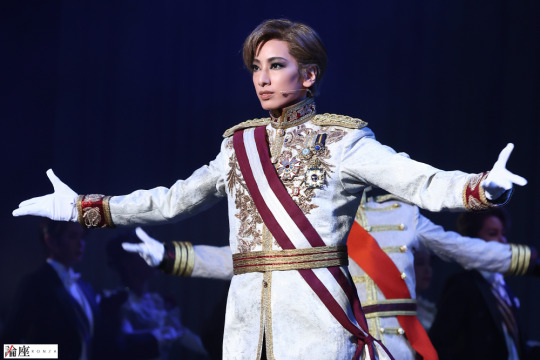
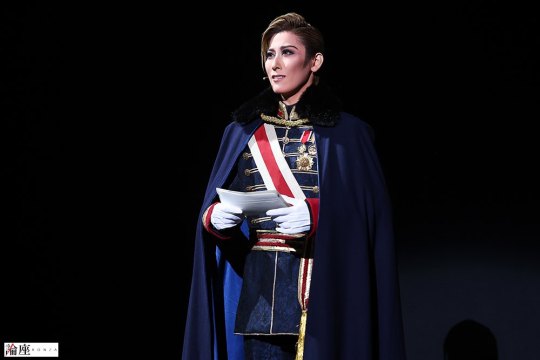
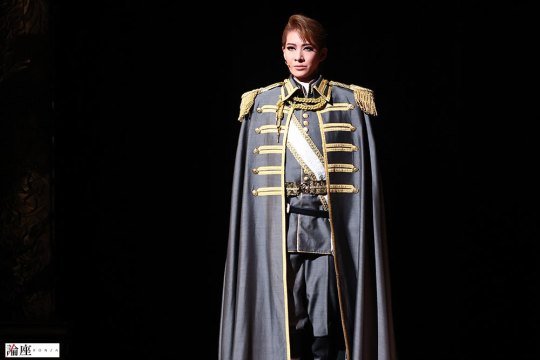
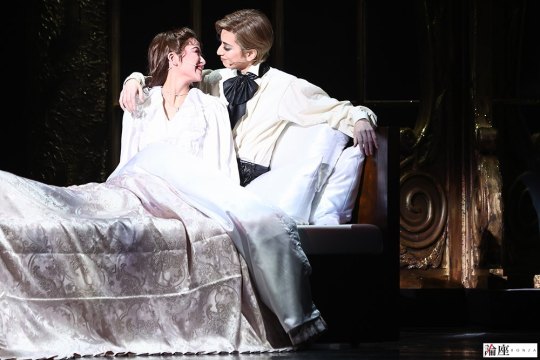

【Performance Review】Flower Troupe “MAYERLING” “ENCHANTEMENT -A Luxurious Perfume-”
A royal love romance that Takarazuka Revue is proud of, Yuzuka Rei creates an ultimate aesthetic for the tragic Crown Prince
(This article was taken from Ronza, which you can find the original article here. This is the free coverage of the whole review.)
Flower Troupe performance Musical Romance “MAYERLING” “ENCHANTEMENT – A Luxurious Perfume –” opens its first day (Shonichi) in the Takarazuka Grand Theatre on January 1st.
The stage performance “MAYERLING” is set in 19th century Austria, describing the poignant love story between Crown Prince Rudolf and Baroness Mary. It has been performed several times since its premiere in 1983 and is now proudly a representative performance in Takarazuka Revue. This is both the 40th anniversary since the premiere and performed again in the stage of Takarazuka Grand Theatre after 30 years, adding in new direction that follows current modernity.
The one playing the tragic Crown Prince Rudolf is of course Flower Troupe Top Star Yuzuka Rei-san. Beyond the solemn image of the pure white military outfit, she creates an aesthetic world with her expressions full of despair. Together with Hoshikaze Madoka-san who plays as Mary, you have the beautiful and compatible Top Combi. This ephemeral, beautiful, ultimate love romance opens 2023 for Takarazuka Revue glamorously. (Spoilers below.)
Yuzuka’s beauty in the tragic prince
When we talk about “MAYERLING”, the first we remember is the opening scene, right. Symmetrical to the crimson red grand staircase are Rudolf and Mary standing and just from that alone, Takarazuka fans can’t hold their enthusiasm anymore. Then comes the dramatic introduction of Rudolf and Mary’s lines, which is definitely the signature of this production. That moved feeling when the curtain opens up as the beautiful melody plays, is unchanging in any era.
–– January 26 1889, the German embassy in Vienna. In the ball where the royal family attended, happily dancing are Crown Prince Rudolf (Yuzuka) and baroness Mary Vestera (Hoshikaze). But both of them already secretly made decisions in their heart.
Going back in time 9 months ago. Heralded as the next emperor, Rudolf was burdened with affairs and conventions, having a cold relationship with his wife Stephanie (Haruhi Urara) and living the stifling days. On the other hand, (Rudolf) praises the lives his cousin Johann (Minami Maito) and his lover Millie (Hoshizora Misaki) lead, despite (Johann) being a member of the Habsburgs. One day, Rudolf met Mary in the celebration of Burgtheatre. Since he also wants to live a life like Johann... He couldn’t stop thinking about it and he was strongly interested by the girl ––
The prologue continues with a Vienna Waltz, a graceful one. The beautiful musumeyaku and the princes, whom look like they came out from mangas, danced ballet and right from there, the atmosphere is dreamy.
In that kind of world view, Rudolf who appears in that Viennese ball is especially beautiful. Her sadness concealed in her gaze and her flawless and smart actions made me realise again that this is the charm of Takarazuka otokoyaku which cannot be found elsewhere.
Responsible for the next era of Europe is successor Rudolf, who doesn’t have a day of rest in heart. The feud with his father, the relationship with his mother, his childhood education... You could see that invisible heavy pressure, and that loneliness clouded on Yuzuka-san’s Rudolf and by seeing that alone makes me heart wrenched. It is eerily fascinating to see how fitting it is for this prince chained in this decadent and aesthetic world, to have a horrifying skull and pistol on his table. Above all, when he couldn’t meet Mary, his sexy aura is exquisite as he rumages his military outfit in the bar. This process enhances persuasion as we see how Rudolf is forced into where he was.
Yuzuka-san has already played Rudolf in 2014 Flower Troupe performance “ELISABETH”. Even though she was also amazing then, this depth accumulated over the year adds onto a new layer of charm. I can experience yet a different depth of emotions.
【公演評】花組「梅耶林」「ENCHANTEMENT -華麗的香水-」
寶塚歌劇團引以為豪的皇室愛情羅曼史,柚香光為悲情的皇太子打造極致審美
(本文摘自論座,您可以在此處找到原文章。這是整個評論的免料部分。)
1月1日,花組公演浪漫音樂劇「梅耶林」「ENCHANTEMENT – 華麗的香水 –」初日在寶塚大劇場開幕。
舞台劇「梅耶林」以19世紀的奧地利為背景,描述了魯道夫皇太子與瑪麗男爵夫人之間淒美的愛情故事。 自1983年首演以來已多次公演,現已成為寶塚歌劇團的代表公演。 這既是首演40週年,也是時隔30年再次登上寶塚大劇場的舞台,增添了符合現代性的新執導方向。
扮演悲慘的皇太子魯道夫的,當然是花組的TOP STAR柚香光了。 在純白軍裝的莊嚴形象之外,她充滿絕望的表情營造了一個唯美的世界。 與扮演瑪麗的星風まどか一起,就是美麗且兼容的TOP控比。 2023 年,寶塚歌劇團以這種短暫、美麗、終極的愛情羅曼史開場。(以下劇透。)
悲劇的王子,柚香的美
說起「梅耶林」,我們最先想到的應該是開場吧。站在赤紅色大階段與之對稱的是魯道夫和瑪麗。光看這一點,寶塚的粉絲們就再也按捺不住了。然後是戲劇性的序幕,魯道夫和瑪麗說出台詞,絕對是這部作品的標誌。伴隨著優美的旋律拉開帷幕的那種感動,在任何時代都不會改變。
——1889年1月26日,德國駐維也納大使館。 在王室一家都出席的舞會上,皇太子魯道夫(柚香)和男爵夫人瑪麗維斯特拉(星風)歡快地跳舞。 但兩人心裡都已經暗自做了決定。
在9個月前,被譽為下任皇帝的魯道夫身負繁重的事務和慣例,與妻子斯蒂芬妮(春妃うらら)關係冷淡,過著令人窒息的日子。 另一方面,儘管(約翰)是哈布斯堡王朝的成員,(魯道夫)讚揚他的堂兄約翰(水美舞斗)和他的情人米莉(星空美咲)的生活。 一天,魯道夫在城堡劇院的慶典上與瑪麗相遇。 因為他也想過著約翰那樣的生活⋯他不禁想到這裡,對這個女孩產生了濃厚的興趣——
序幕以優美的維也納華爾茲繼續。 美麗的娘役們和彷彿從漫畫中走出來的王子們跳著芭蕾舞,一開始就營造出夢幻般的氛圍。
在那樣的世界觀裡,在那個維也納舞會上出現的魯道夫格外美麗。 她那眼神中隱藏的憂傷,那完美無瑕的動作,讓我再次體會到,這就是寶塚男役的魅力,在別處是找不到的。
本身應承擔下一個歐洲時代的是繼任者魯道夫,他心中沒有一天可以休息。 與父親的不和,與母親的關係,從小的教育⋯可以看到籠罩在柚香桑魯道夫身上那無形的沉重壓力和孤獨感,光是看到這些就讓人心痛。 看到這位被困在這個頹廢又淒美世界中的王子,桌子上放著可怕的頭骨和手槍竟然是多麼合適,是不可思議的感覺。最重要的是,在無法見到瑪麗艾的情況下,他在酒場弄亂了軍裝,散發著性感的氣質是極致的。當我們看到魯道夫是如何被逼迫時,這種過程增強了說服力。
柚香桑已經在2014年花組公演「ELISABETH」中飾演魯道夫。 儘管她當時也很了不起,但多年積累的這種深度,又增添了一層新的魅力,體驗到不同深度的情感。
50 notes
·
View notes
Text
My relations with the Duke of Reichstadt (1/?)
Hey, guys! First of all, happy Murat day!
I know it's a bit contradictory that I'm posting King of Rome content on Murat's birthday, but I can't let go that the King of Rome's bday was the 20th! I wanted to draw something to celebrate it, but instead, I'll leave you with these memories of his best friend; Count Anton Prokesch-Osten about him. Please, forgive some misspelling you could find, since nor german, french or english are my native language! This text was translated from the german to the french, and so, I translate this to the english for you! Hope you enjoy it!
For some context, the King of Rome/Napoleon II is living in Vienna (he started living there at the age of three) at the time this takes place. They refer to him by his title (Duke of Reichstadt) or by "Franz".

The Duke of Reichstadt was then for me, as well as for all circles of Viennese society, one of those appearances that were as attractive as they were endearing. However, I hadn't had a chance to get close to him until then. Now, precisely around this time, my destiny took me to Trieste, then in the midst of the battles where Greece shed its blood in floods on the mainland and on the islands, finally to Constantinople, in Asia Minor, Syria, Egypt and Nubia. After six years of absence, I returned to my native land, where I found a welcome full of kindness and consideration. At that time, when no steamboat had yet sailed the seas of the Levant, voyages to such distant lands, participation in events which, like the struggles of the Greeks against the Turks, had the privilege of exciting minds to the point of higher, they were considered almost as a merit, and reflected a certain brilliance in whoever had achieved them. My native city, Gratz, gave me a particularly flattering reception, when in June 1830, I went there for a few weeks to see relatives and friends, as well as to find these places still filled with the sweetest memories and that had been the theater of my early youth.
At the same time the court also came to reside at Gratz, and on the 22nd of the same month, I had the honor of being invited to the imperial table; placed in front of the Empress, I had the Duke of Reichstadt next to me, seated in front of the Emperor. This handsome and noble young man with deep blue eyes, a masculine forehead, abundant blond hair, silence on his lips, calm and self-possessed in all respects of him, made a truly extraordinary impression on me. I had a feeling similar to the one that comes over a teenager who first meets the young woman to whom he will give his heart. I only exchanged a few shy words with him the whole time we sat at the table; because the Empress and my former protector, Archduke John, were never tired of me telling them what I had seen and learned in foreign countries that we then considered so distant. Much better, after dinner they held me back for several more hours, and when I was finally allowed to retire, the Duke of Reichstadt barely had time to throw these few words at me:
"You've known me for a long time," and he squeezed my hand as if we were old friends.
This handshake was, in fact, a promise for the future. It could only have been given in this sense, and I did not attribute any other idea to it.
The next morning Count Maurice Dietrichstein, to whom the Duke's education was entrusted, came to my house. The count had shown me kindness from the moment that the favor of the princely house of Schwarzenberg had supported me. He reiterated the reproach already formulated the day before, namely, that, although he had been in the same city for a week, he had neglected the duke. The count offered to take me to the young prince at the same moment. I followed him with pleasure. At my entrance, the duke, whose attitude was not at all like that of the day before, rushed towards me with all the petulance of youth, his look animated and full of confidence. Repeating the words of the previous day, he exclaimed:
"You have known me and I have loved you for a long time. You defended my father's honor at a time when everyone was slandering him at will. I have read his memoirs on the Battle of Waterloo and, to better understand each line, I have translated them twice, first in French and then in Italian.”
I responded in terms inspired by the desire to bond closely with this handsome young man so neglected in this world.
Count Dietrichstein took the conversation to Greece. Expressing the most ardent wishes for prosperity for this people, who are now called to live their own lives again, already the day before, after having dinner with the imperial family, I supported the opinion that, despite the unfavorable conditions resulting from war, anarchy, factions, mismanagement, Greece, if given a prince of a European dynasty as king, and if its organization were not the work of diplomatic insufficiency, would move very rapidly towards a flourishing future. In the presence of Archduke Jean, Count Maurice, Colonel de Werklein, intendant of the Archduchess Maria Luisa, I, taking advantage of a moment when the Duke of Reichstadt was busy elsewhere, slipped into the course of the conversation the idea that the throne of Greece, devoid of claimants since the refusal of the Prince of Coburg, could not be handed over to a more worthy than the son of Napoleon: This proposal had received, to my surprise, general approval, The Empress herself, who, during this conversation had approached us, did not seem to oppose it. She had expressed this idea without yet knowing that they were the views of the Prince of Metternich; however, as early as 1825, I became aware of the statement made by this diplomat in St. Petersburg:
"One of two things: either the Greeks will again be subjected to Bonaparte, and given administrative autonomy; or an independent Greece will be constituted in such a way that it will not necessarily be Bonaparte's enemy."
However, Count Maurice had given me the chance to talk about Greece once more that morning, the duke soon guessed my thoughts and caught fire with my words. We were interrupted at that moment by the General Prince of (...). He wanted to say goodbye; however the duke insisted:
"The general," he told me, "he'll only stop for a moment, and I'd be very upset if I lost you soon."
I stayed. The Prince of (...) soon left, rebuffed by the duke's laconicism. So Count Dietrichstein brought up the conversation about Napoleon.
The duke spoke with high spirits. We could feel in each of his words the warmest admiration, the deepest attachment for his father; however, he preferred to rely on his military talents. To take him as a model and thus become a great captain, at this point he was all fire, all flame. We discussed several of the Emperor's maneuvers, including Austerlitz. I was surprised by the prince's strategic judgment and the precision of his expressions. Of all the officers and generals then at Gratz, there was, of course, not one who had the keenest military eye and was endowed with the most pronounced aptitude for command-in-chief. He returned not only to my published account of the Battle of Waterloo, but also to "the memorable events in the life of Field Marshal Prince Charles of Schwarzenberg.
The duke appreciated them with a sagacity that astonished me. Then he complained of his isolation, and poured out his soul in these words:
"Stay with me; sacrifice your future for me, stay with me! We are made to understand each other!"
He expressed himself with such warmth that he touched me to the bottom of my heart. Then he continued:
"If I am called to be another Prince Eugene for Austria, the question I ask myself is this: how will it be possible for me to prepare myself for this role? I feel indecisive in choosing a man capable of introducing me to the high demands and noble duties of the military career. I do not have and do not see any man of this merit in my entourage."
Count Dietrichstein witnessed this departure, and seemed to find it natural and fair. I reproached the duke, cordially shaking his hand, for judging too hastily. He accepted my guilt without taking offense and listened deferentially when I expressed the doubt he felt about my ability. Our interview was interrupted by the General Count of Leiningen, whom I could not refuse to receive. But, once again, he did not let me go, and as soon as the count left, he resumed the conversation about his father's feats of arms.
As it was necessary to pay my respects to his mother, the Archduchess Maria Luisa, I could hardly delay any longer; I warned him about it and said goodbye to him. I had been at the archduchess's for barely half an hour when the duke went there in the same manner. His mother received him tenderly; he kissed her with a rather serious air. The conversation focused on his childhood. He wanted her to give him more precise information about Colonel Sèves, who had accompanied him from Paris to Blois in March 1814, and whom he had met in April 1828 in Modon, at Ibrahim-Pasha's house. I had to tell him what the colonel had taught me about this fatal escape.
We perceived each other as two men who were convinced that nothing could separate them.
Source:
Mes relations avec le duc de Reichstadt : mémoire posthume / par le comte de Prokesch-Osten,. . . ; traduit de l’allemand [par A. de Prokesch-Osten fils]. Gallica. https://gallica.bnf.fr/ark:/12148/bpt6k6536278r/f38.item.zoom
#napoleon ii#klemens von metternich#l'aiglon#karl zu schwarzenberg#the king of rome#memoirs#anton prokesch-osten#duke of reichstadt
35 notes
·
View notes
Photo
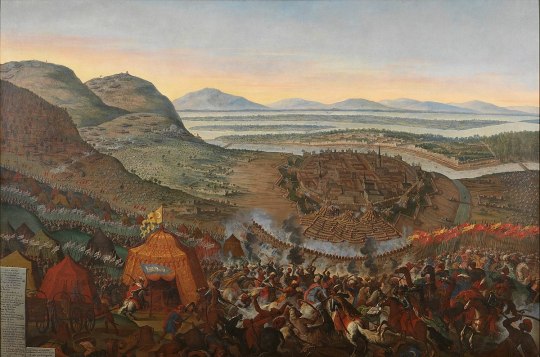
Frans Geffels - The relief of Vienna in 1683 - 1683-4
oil on canvas, height: 184 cm (72.4 in); width: 272 cm (107 in)
Vienna Museum at Karlsplatz, Austria
The Battle of Vienna took place at Kahlenberg Mountain near Vienna on 12 September 1683 after the imperial city had been besieged by the Ottoman Empire for two months. The battle was fought by the Holy Roman Empire (led by the Habsburg monarchy and the Polish–Lithuanian Commonwealth, both under the command of King John III Sobieski) against the Ottomans and their vassal and tributary states. The battle marked the first time the Commonwealth and the Holy Roman Empire had cooperated militarily against the Ottomans, and it is often seen as a turning point in history, after which "the Ottoman Turks ceased to be a menace to the Christian world". In the ensuing war that lasted until 1699, the Ottomans lost almost all of Hungary to the Holy Roman Emperor Leopold I.
The battle was won by the combined forces of the Holy Roman Empire and the Polish–Lithuanian Commonwealth, the latter represented only by the forces of the Crown of the Kingdom of Poland (the march of the Lithuanian army was delayed, and they reached Vienna after it had been relieved). The Viennese garrison was led by Feldzeugmeister of the Imperial Army (Holy Roman Empire) Ernst Rüdiger Graf von Starhemberg, an Austrian subject of Holy Roman Emperor Leopold I. The overall command was held by the senior leader, the king of Poland, John III Sobieski, who led the relief forces.
The opposing military forces were those of the Ottoman Empire and its vassal states, commanded by Grand Vizier Merzifonlu Kara Mustafa Pasha. The Ottoman army numbered approximately 90,000 to 300,000 men (according to documents on the order of battle found in Kara Mustafa's tent, initial strength at the start of the campaign was 170,000 men). They began the siege on 14 July 1683. Ottoman forces consisted, among other units, of 60 ortas of Janissaries (12,000 men paper-strength) with an observation army of some 70,000 men watching the countryside. The decisive battle took place on 12 September, after the arrival of the united relief army.
Historians maintain that the battle marked the turning point in the Ottoman–Habsburg wars, a 300-year struggle between the Holy Roman and Ottoman Empires. During the 16 years following the battle, the Austrian Habsburgs gradually recovered and dominated southern Hungary and Transylvania, which was largely cleared of Ottoman forces. The battle is noted for including the largest known cavalry charge in history.
Frans Geffels, known in Italy as Francesco Geffels (25 August 1624 – 18 February 1694) was a Flemish painter, printmaker, architect, stage designer and designer of ephemeral structures for solemn and festive occasions. After training in his native Antwerp, he was mainly active in Mantua, where he was prefetto delle fabbriche to the Duke, a role that gave him the direction of the artistic and construction activities undertaken by the Ducal court. He worked also on projects for the local aristocratic class of Mantua. In addition, he completed projects for the Liechtenstein princes and for the imperial court in Vienna.
He was both a canvas and fresco painter. He created portraits, history subjects, military scenes, architectural scenes and genre art, in particular merry companies. Geffels is mainly remembered as the designer of some of the key examples of Baroque architecture in Mantua.
21 notes
·
View notes
Note
YESS, MATCHMAKER TROPES ARE SO INTERESTING 👏 Ngl, I was kind of nervous sending that one in kjfgndfkg-
So instead of doing school work like a normal human being, I decided to impulsively put together a whole bunch of concept voice lines/dialogue pieces for Ikevamp Beethoven 🧍 And yes, I am very normal about him (This is a lie)
But before that!! Have some more details about him- (Ngl, I love how we’re both talking about an Ikevamp OC and I’ve,, never played the game- I’m gonna try and see some gameplay about it later though if I can kjfngdfh-)
-He has a coarse German accent
-I like to think he’d occasionally slip in a few German words here and there,, (is this a self-indulgent detail of mine? ,,Perhaps-)
-Despite being a composer, he actually can’t dance or sing! As he says, “I can compose, thank God, but I can’t do one other thing on earth.”
-He did speak softly, but after he started to experience hearing problems, his voice shifted into something more louder
-The more angrier he gets, the more louder and thicker his accent gets-
-He speaks kinda formally, but again, he’s a Grump™, so he can be quite curt,,
-Fluent in German and English, can also speak Italian and French, and he does know some Latin!
-He always carries paper and a pen with him, just in case he gets inspired or has an idea for music
-He’s,, kind of lonely?? He doesn’t have many friends given his sharp tongue and hot temper,,,
-Again, he’s partially deaf/has hearing problems, so he’s picked up the habit of lipreading. But he’d definitely appreciate it if you spoke louder to him (though, he’d definitely wouldn’t want anyone shouting at him)! He’s gonna have trouble hearing you though if you’re like,, far across a room or something. Ngl, this led to me writing this-
MC, at one far end of the room: What was your childhood dream??
Beethoven, at the other end: What??
MC: What was your childhood dream??
Beethoven: ?? No, I like ice cream!
Dhjfbg Anyway,,! On to the voice lines, asdfgh-
Beethoven: Greetings, MC, my name is Ludwig van Beethoven. Any charm or taste I may have has been poured entirely into my compositions. Regarding myself, I am simply a freelance musician. That's all the introduction you need.
Beethoven: Social etiquette of Viennese aristocracy? Hah, it’s an endless subject. Shaking off commoners, behaving only in particular ways… It all demands carefully calculated courtesies that I find hard to conjure myself. Herr Comte de Saint Germain is a nobleman himself, is he not? I’m sure he is more knowledgable on how noblemen and noblewomen behave than I.
Beethoven: My opinion on Napoleon Bonaparte? Hah! That “emperor,” that wretched snake, is nothing but a small, ordinary tyrant who tramples on human rights. He’s a miserable blackguard, a godforsaken man with a puddle of poison for a heart! He’s a beast in spite of his charms. No, lower than a beast. Stay far away from him, lest you get caught in any deception of his.
[Note: “Small,” he says,, Ikevamp Napoleon is 5’8. Ikevamp Beethoven’s 5’3, literally the shortest man in the cast,,]
Beethoven: Ah, MC. I was just about to go out on a walk through the forest. Forgive me, but I would like to go alone today. I need to sort out my thoughts.
Beethoven: …Ah-hah! I’ve come up with a new melody! I must write this down immediately.
Beethoven: Watch that the notes in my pocket don’t spill out.
Beethoven: I’ve written a new song. Would you like to hear?
Beethoven: Nothing is more intolerable than having to admit to yourself your own errors.
Beethoven: I love a tree more than a man.
Beethoven: My thoughts on Herr Mozart? Well, I have always greatly admired him, ever since I was a young boy. I regard myself as one of his greatest admirers. …Hm? Why do you seem surprised? I am capable of praise. …Pardon? You’d think we’d see each other as ‘musical rivals…?’ What a ridiculous thing to say. I don’t regard him as a rival at all. His music has qualities I wish to emulate, yes, but me and nobody else will ever be able to do anything like that.
Beethoven: I have never thought of writing for reputation and honor. What I have in my heart must come out; that is the reason why I compose.
Beethoven: Ach, was für eine Qual... Ah, MC. I didn’t hear you approach.
Beethoven, at Napoleon: Do you think I give a damn about you and your pathetic violin?
Beethoven: When I was younger, I had trouble keeping up with reading and writing more than other children. There’s a term for it now, I believe…? Dyslexia, if I’m correct. While I have gotten better at the subject, I’ll admit, I do occasionally struggle. But in any case, I would rather write ten thousand notes than a single letter of the alphabet. Music comes to me more readily than words.
Beethoven: Ah, sehr gut, you’ve found my notes. Thank you, Fraülein MC.
Beethoven: My family? …They are not something I wish to talk about.
Beethoven: The amount of money one needs is terrifying…
Beethoven: Only the pure in heart can make a good soup. 👌
Beethoven: Music can change the world. Yes, that is what I wholeheartedly believe.
Beethoven: When I first started developing my partial deafness, I was sent into a panic. The ringings in my ears were a telltale sign of what was to come. When my deafness started getting worse, I avoided social gatherings because it was impossible for me to say to people “I have trouble hearing,” or “I’m going deaf.” If I belonged in any other profession, it would be easier for me to say, but in my profession, it is a frightful state. I remember once I laid my head on my piano, desperately and loudly banging the keys just so I could hear what I was playing.
Beethoven: "Eine ungenügende Leistung…” No, it’s fine, it’s just something I often heard when I was a boy. You can ignore it.
[Translation: “What an unsatisfactory performance…” He may or may not be hinting a little at his father here,, who again, struck at Beethoven’s hands whenever he got a note wrong-]
Beethoven: I hear a musical genre known as “jazz” was quite popular for a time. I've had the fortune to hear a few records. The free, unweighted playing style greatly amuses me. Perhaps I will try my hand at the genre someday.
[OKAY,, I DON’T KNOW IF THERE ARE ANY KIDS IN THE MANOR, BUT I REMEMBER THERE BEING A FLASHBACK INCLUDING CHILDREN,, AND THERE WAS AN IKEVAMP FIC INCLUDING KIDS,,, I feel like I’m incredibly wrong though, so please correct me asdfgh)
Beethoven: I know of no more sacred duty than to educate a child. If any children wishes to learn piano, or any other instrument, you may send them to me, but I am a strict teacher. I’m not one to release a student partway after he or she begins their studies.
Beethoven: I recommend being virtuous to the children. Virtue alone, and not money, can make one happy. I speak from experience. …It is my wish that they may have a better and freer life than I have had.
Beethoven: Vampire haben ein verbessertes Gehör und Sehvermögen...? Hah, was für ein grausamer Scherz, den Gott mir präsentiert. …No, no, it is nothing.
[Translation: Vampires have enhanced hearing and vision...? Hah, what a cruel joke God is presenting to me.]
Beethoven: I value honesty and integrity above all else. One who lies is not pure of heart.
Beethoven: The foundation of friendship demands the greatest likeness of human souls and hearts. No friend have I. I live by myself alone; but I know well that God is nearer to me than others in my art, so I will walk fearlessly with Him… However, Fraülein MC, that is something you have changed, and I must thank you. You have been my first true friend. I shall never forget the days I spent with you. All I ask is that you continue to be my friend, as you will always find me yours.
Beethoven: Now, off with you! You’re a happy woman, you’ll give happiness and joy to many other people, and there is nothing better or greater than that.
Beethoven: In the world of art, as in the whole of creation, freedom and progress are the main objectives. Persevere, do not only practice your art, but endeavour also to fathom its inner meaning; it deserves this effort. For only art and science can raise men to the level of God. It demands that we shall not stand still.
Beethoven (this one is specifically aimed at you, Auburn 🫵): What do I think of Herr Newton? I admire both his intellect and contributions to the sciences and mathematics. I don’t know him well, but whenever he starts to talk about his sciences, I can hardly keep up. It’s not my forte. However, I do have great respect for him - he is the pioneer of his field. …Ah, I must ask, have you established a courtship with him yet? Was? Why do you look so shocked? You are trying to make your apparent interest in him quite clear, aren’t you?
Evil Beethoven be like: “I hate Mozart.” / “I like Napoleon.”
Dghkjd I hope you enjoyed this!!
Jackdaw Anon 🐦
I ENJOYED THIS IMMENSELY JACKDAW ANON IT WAS SO GODO AND WELL PUT TOGETHER KASHGDJASGHDJSA I AM AMAZED AT HOW MUCH THOUGHT YOU PUT INTO ALL OF YOUR IDEAS EVERY TIME I GET AN ASK FROM YOU :D!! AND PLEASE, DONT BE EMBARRASSSED I LITERALLY GOBBLE UP EVERYTHING YOU SEND ME AND I LEAVE NO CRUMBS RAHHHHHHHHHHHHHHHH
Beethoven: Only the pure in heart can make a good soup. 👌
THIS LINE MADE ME LAUGH AS I WAS READING and i know you mentione dhim actually saying something like that before BUT IT MADE ME THINK OF CLAVIS WHO IS AN IKEMEN PRINCE CHARACTER THAT MAKES THE MOST FUCKED UP SOUP KNOWN TO MAN ITS HILARIOUS HELP
oh gosh and the dialogue you wrote about him slowly losing his hearing? gahh i had to cove rmy mouth i was so?? haunted??? by the imagery of his just desperately slamming piano keys and omggg you're too good at this.
[Translation: “What an unsatisfactory performance…” He may or may not be hinting a little at his father here,, who again, struck at Beethoven’s hands whenever he got a note wrong-]
CAN WE FIGTH HIS DAD IS THAT ALLOWED I WOULD LIKE TO PERSONALLY ON BEHALF OF THE ENTIR GRUMPY AMN ENTHSUIAST ASSOCIATION.
DW JACKDAW ANON THERE ARE KIDS!! not in the mansion, but isaac and napoleon teach a bunch of little kids and im sure they wouldnt mind teh addition of beethoven!! he can teach them music since mozart isnt really taht social (and even though beethoven isnt either, i can see the kids taking a shine to him anyway LMAO)
HIS DIALOGUE ABOUT TEH MC BEING HIS FRIEND SHSPTOWPSTTSOPSOTOPOP STOPPPP IM CRYINNG!?!?!?!?!? THATS SO WHOELSOME AND SWEET :(((( ASJHGDJAHSGD WHY ARE YOUS O GOOD AT THIS I HATE IT I HAVE GONE THROUGH SO MANY EMOTIONS IN THE SPAN OF LIEK TEN MINUEST HELLO!!!!!
AND THE DIALOGUE YOU WROTE JUST FOR EM?!?!?!?!? I LOST MY SHIT WHEN I READ THAT HELLO YES SIR I AM MAKING MY INTEREST VERY CLEAR I AM KISSING HIM GOODNIGHT I AM MAKING HIM SANDWICHES I AM SETTING UP HIS TELESCOPE FOR HIM EVERY NIGHT SO WE CAN STARGAZE AJHSFDJASFDSAG
THANK YOUS O MCUH FOR THIS JACKDAW ANON YOU ARE LITERALLY AMAAZING
5 notes
·
View notes
Text
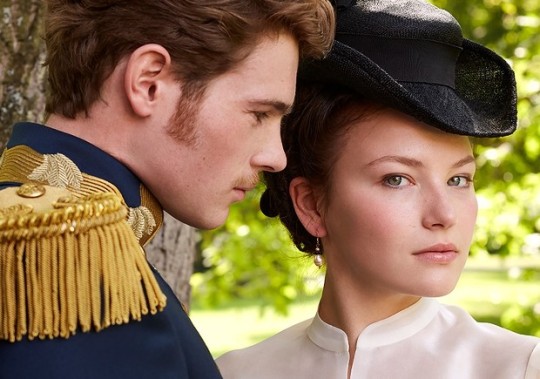
Philip Froissant and Devrim Lingnau in The Empress
(© Thomas Schenk)
Katrin Gebbe and Florian Cossen are readying The Empress for Netflix.
The six-part German-language mini-series will focus on the months that follow the arrival of Elisabeth “Sisi” von Wittelsbach, Princess of Bavaria, at the Viennese Imperial Court and the beginning of her marriage to Franz Joseph, the Emperor of Austria-Hungary.
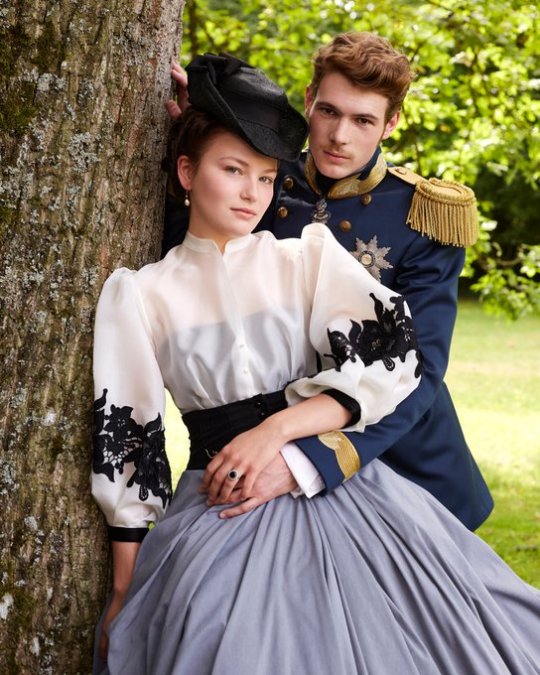
The series will depict how, after the wedding, the young empress has to adapt to a world that is still foreign to her, and deal with her demanding mother-in-law Sophie and with Franz’s difficult brother Maxi.
While enemy troops are gathering on the borders of the Habsburg Empire, Elisabeth discovers that she must carefully ponder whom she can trust, and that turning into a figure of hope for an entire people comes at a price.
21 notes
·
View notes
Note
Hi, hope this question won’t be too long.
In “The Real Francis Joseph, the Private Life of the Emperor of Austria,” by Henri de Weindel, it states that in 1873 at the Vienna Exhibition, Empress Elisabeth was given an Egyptian slave who was part of the exhibit. The book later states that Elisabeth nursed the boy when he was sick and that he became a playmate to Marie Valerie and Sisi even had them photographed together and allowed copies of the photo to be sold. However, when the photo was caricatured in the newspaper Franz Josef became so angry he had all copies of the photograph and caricature destroyed. Another source said the boy was named Mahmoud (with the spelling varying according to source).
My question is though is there any information on what became of the boy afterwards? (The Weindel book doesn’t mention Mahmoud beyond this event). Or even to the accuracy of this incident?
Hello! I think Wendel is actually talking about a boy called Rustimo, who entered Elisabeth's service around 1877:
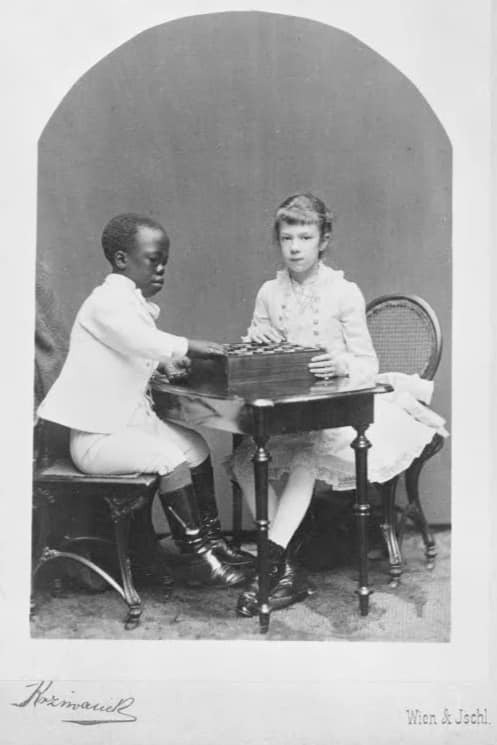
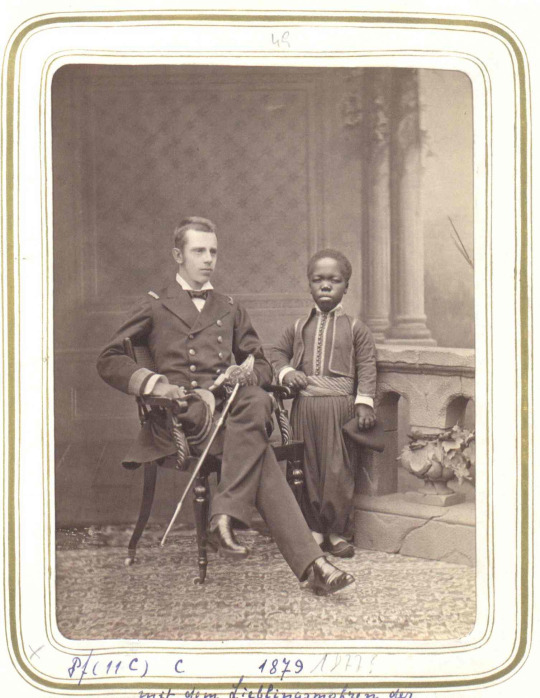
Rustimo with Archduchess Marie Valerie and with Crown Prince Rudolf.
There doesn't seem to be an agreement on how Rustimo actually entered Elisabeth's entourage. According to Corti, Rustimo was "presented to her by the Khedive [the title of the governor of Egypt]" (1936, p. 280), meanwhile Brigitte Hamann says that he was "a blackamoor the Shah of Persia (according to one of various versions) had sent as a gift" (1986, p. 231). Giving that in both versions he was allegedly a "given" to the Empress, it may be safe to assume he indeed had been enslaved.
Before continuing, I'd like to make a small detour to talk about an event from Elisabeth's childhood: her father buying five enslaved boys in one of his trips.
Soon after the future Empress of Austria's birth, her father Duke Max in Bavaria embarked on a several months-long trip to Orient. In Cairo Max visited the slave market, and was horrified of seeing "people being sold like cattle", as he later wrote down in his memoirs about the trip (Winkelhofer, 2022). It was then probably an attempt at altruism what brought him to buy five boys from the market and bring them back with him to Munich, instead of just an "eccentricity" as it's often put.
Why did I mention this? Because the boys remained in the service of the Duke for many years. As Dr Martina Winkelhofer points out:
They lived in the servants' quarters at the back of Palais Max, on the second floor. Elisabeth also had her room up there, but at the front of the building. Having to deal with black servants was an everyday occurrence for her from childhood. (ibid)
Considering this, it wouldn't have been "exotic" for her to take Rustimo into her household. But given the reaction of the court, it's not strange that previous biographers see this only as her wanting to offend Viennese society. Landgravine Therese Fürstenberg, one of the Empress' ladies-in-waiting, wrote to her sister in August of 1877 that (warning for racist connotations):
The Archduchess [Valerie] recently took the blackamoor along on the promenade, he was put in the carriage with the French teacher, who sat next to the heathen feeling shamed and sad; the Archduchess always gives candy to children along the road. But now none of them dared to come near her when they saw the black boy and tried in every way to avoid the monster and his bared teeth, so as to get to the candies; all this seemed a great joke to the little girl. (Hamann, 1986, p. 231)
We have (even more) explicitly racist comments made by Landgravine Fürstenberg as well as by Countess Mária Festetics, another lady-in-waiting, but I rather not share them, they're just too nasty and add nothing to the post. You can make an idea of how everyone felt about Rustimo.
And what about Valerie? According to Corti, she "was afraid of him and took some time to grow accustomed to him" (1936, p. 280). But she never wrote down her feelings about her playmate. In the over 300 pages of her diary, she only mentions him once, in an entry from February 24 of 1880:
At ½7 Puttl and Raab come and we both have a dance lesson together until 7 o'clock when we have a supper and then "Eile mit Weile" [a board game] with Rustimo. Papa comes after ½8 until 8 o'clock. Then I go to bed (p. 21)
Elisabeth had Rustimo baptized in 1878 (it was just unacceptable that the Catholic Habsburgs had a heretic in their service). He was given the Christian name of "Rudolf" after the Crown Prince, his godfather. The Empress wrote of this ocasion to her mother Ludovika:
Today was Rustimo's christening in Valerie's salon… Rudolf was godfather. It was solemn and ludicrous, there were tears and laughter. He himself was very moved and wept. (Hamann, 1986, p. 231)
Rustimo continued to ascend in the Empress favor, and in 1884 he was made "announcer of the bedchamber". He remained in the service of Elisabeth until 1890, when he was pensioned, and in 1891, Rustimo "was sent to the charity institution in Ybbs, where he died the very next year" (Hamann, 1986, 232).
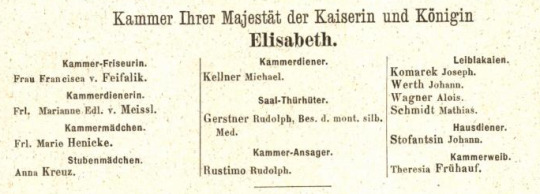
Screenshot of the Official Guide of the Austro-Hungarian Empire from 1890 that shows Rustimo as part of the staff of Elisabeth's chamber (middle column, at the bottom).
While Hamann states that Rustimo fell out of favor in 1885 (she gives no source for this) and that after he left court he was abandoned, Winkelhofer claims that, while writing her two-part biography of Elisabeth, she found evidence that it was the Empress who payed for Rustimo's stay at the institution Hamann mentions, and also for his grave when he died (she wrote about this on Instagram but I cannot for the life of me find in which post, you'll have to trust me on this one sorry). Winkelhofer has said that the second part of her biography, which will be published on August this year, will have this evidence, as well as new information about Rustimo; she claims it we'll give us a new image of him. This is actually the reason why I hadn't written about Rustimo yet, I was waiting for her book to come out to have all the information we have available and make a more complete post.
As for the claims made by Wendel, I honestly don't know. None of Elisabeth's biographer mention anything of her nursing Rustimo, and clearly all the copies of the picture of of him with Valerie weren't destroyed, since we have it to this day.
Before finishing this post, one more thing: Muhammed was a different servant! We know nothing (yet) of him, in fact neither Corti nor Hamann mention him in their books. Winkelhofer just says in the first part of her biography that "the Nubian Muhammed Beschir, [was a] servant for three years until his return to Africa" (2022). But she has also promised to reveal what she has discovered of this unknown servant in the second part of her biography, and I can't wait for it!
I hope that you found my answer helpful and I promise you to update this ask when I get Winkelhofer's book!
Sources:
Corti, Egon Caesar Conte (1936). Elizabeth, empress of Austria (translation by Catherine Alison Phillips)
Hamann, Brigitte (1986). The Reluctant Empress: A Biography of Empress Elisabeth of Austria (translation by Ruth Hein)
Hof- und Staatshandbuch der Österreichisch-Ungarischen Monarchie, 1890
Schad, Martha and Schad, Horst [ed.] (1998). Das Tagebuch der Lieblings Tochter von Kaiserin Elisabeth. 1878-1899
Winkelhofer, Martina (2022). Sissi. La vera storia. Il cammino della giovane imperatrice (translation by Federica Saccucci)
#rudolf rustimo#empress elisabeth of austria#archduchess marie valerie of austria#crown prince rudolf#asks
20 notes
·
View notes